Authors — Nicholas Rombes
-
The Blue Velvet Project, #91
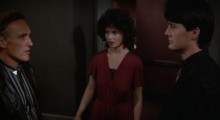
Second #4277, 71:17 1. This is the first time that Frank, Dorothy, and Jeffrey appear together in the same frame. 2. “Oh, you’re from the neighborhood,” Frank says. “You’re a neighbor. Well what’s your name neighbor?” 3. The ratings for “Mister Rogers’ Neighborhood” peaked in 1985, the year before Blue Velvet was released. 4. It’s not only Frank’s eyes that terrify, but his voice, tinged with sarcasm, delivered in Dennis Hopper’s flat, Midwestern accent. And then, buried in the soundtrack, there’s a low, faint rumbling, like the sound of thunder arriving from hundreds of miles away, having crossed vast, empty […]
by Nicholas Rombes on Mar 19, 2012 -
The Blue Velvet Project, #90
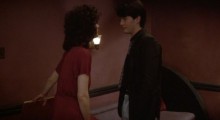
Second #4230, 70:30 In Roberto Bolaño’s short story “Days of 1978” (from the collection Last Evenings on Earth) one of the characters, upon hearing the voice of another character, suddenly and frightfully develops an unsettling and inexplicable image in his mind: It [the voice] conjures up a silent black-and-white film in which, all of a sudden, the characters start shouting incomprehensibly at the top of their voices, while a red line appears in the middle of the screen and begins to widen and spread. What to make of this? It’s nightmarish, but why? Perhaps it’s because what’s described is difficult […]
by Nicholas Rombes on Mar 14, 2012 -
The Blue Velvet Project, #89
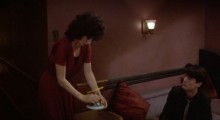
Second #4183, 69:43 In a passage from his 1952 essay “In Defense of Mixed Cinema,” André Bazin seems to predict the future, a future of watching movies in an age of interruptions and distractions. Bazin writes about watching Les Vampires (Louise Feuillade, 1915) during a night full of technical mishaps: That night only one of the two projectors was working. In addition, the print had no subtitles and I imagine that Feuillade would have had difficulty in trying to recognize the murderers. It was even money as to which were the good guys and which the bad. So difficult was […]
by Nicholas Rombes on Mar 12, 2012 -
The Blue Velvet Project, #88

Second #4136, 68:56 After Jeffrey strikes Dorothy, a roar of flames fills the frame. The barely repressed brute logic of the film finally explodes on the screen, as Jeffrey has, at last, become a surrogate Frank. What’s remarkable about the scene is how it’s fashioned from some pretty regressive clichés about abuse, especially in how Dorothy literally “asks for it.” On one level, Blue Velvet’s depiction of women is deformed in the worst possible ways, as it balances Sandy as the objectified virginal “good” girl, full of nurturing love, and Dorothy as the madwoman whore. There’s nothing in between, and […]
by Nicholas Rombes on Mar 9, 2012 -
The Blue Velvet Project, #87
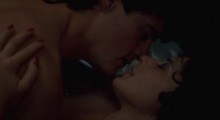
Second #4089, 68:09 1. Dorothy to Jeffrey: “Do you want to do bad things? / Anything . . . anything. / I want you to hurt me.” 2. Ralph Waldo Emerson, from Experience (1844): It is very unhappy, but too late to be helped, the discovery we have made that we exist. . . . Ever afterwards we suspect our instruments. We have learned that we do not see directly, but mediately, and that we have no means of correcting these colored and distorting lenses which we are, or of computing the amount of their errors. Perhaps these subject-lenses have […]
by Nicholas Rombes on Mar 7, 2012 -
The Blue Velvet Project, #86
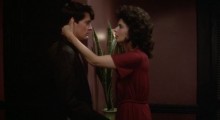
Second #4042, 67:22 In a 1964 interview Orson Welles talked about the relationship between the visual and the spoken word in film. He said that I couldn’t arrive at [the visual] without the solidity of the word taken as a basic for constructing the images. What happens is that when the visual components are shot the words are obscured. The most classical example is Lady from Shanghai. The scene in the aquarium was so gripping visually that no one heard what was being said. And what was said was, for all that, the marrow of the film. Could Lady from […]
by Nicholas Rombes on Mar 5, 2012 -
The Blue Velvet Project, #85
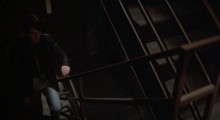
Second #3995, 66:35 1. Jeffrey, just after the kiss with Sandy, is on his way up the dark, industrially-vibed staircase to Dorothy’s apartment. He has had his chaste kiss; new he wants more. He is hungry for Dorothy, who dispenses with shy-girl playfulness and gives Jeffrey the Real Thing. 2. The blackness of the frame. The amount of screen space dedicated to the experience of no visible light. There is light, of course–just enough–but Jeffrey travels in these moments mostly through the dark. 3. In He Died with His Eyes Open, the first of Derek Raymond’s British crime noir Factory […]
by Nicholas Rombes on Mar 2, 2012 -
The Blue Velvet Project, #84
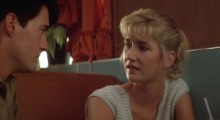
Second #3948, 65:48 “Can a photograph be lonely?” is a question asked in Don DeLillo’s novel Libra. Another version of the question might go, “Can a photograph make a person lonely?” How about a movie frame? How deep can loneliness get, at 24 frames per second? What follows, below, is a visual descent into loneliness, just under two seconds in movie time. It happens so quickly in movies, moments like this. We remember them not frame-by-frame, but decompressed, stretching out and out, a kiss that lasts forever. A kiss that, in our memory, takes up more film time than it […]
by Nicholas Rombes on Feb 29, 2012 -
The Blue Velvet Project, #83 (Part 2)
Second #3901, 65:01 (pt. 2) And so, for the first time in this project, two posts on the same frame. Why? Most of all, it’s because of the brown, paneled wall to Sandy’s left. A wall where you think a window ought to be. Why do you think this? What gives rise to the suspicion that a wall artificially covers (hides) a window? Probably because it’s linked to the first time Sandy and Jeffrey were together at Arlene’s (covered in post #25). Even though it’s possible that they are simply at a different booth, one framed by a wall and […]
by Nicholas Rombes on Feb 27, 2012 -
The Blue Velvet Project, #83 (Part 1)
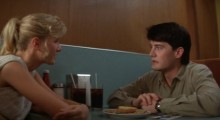
Second #3901, 65:01 1. Jeffrey: “I’m seeing something that was always hidden.” 2. J. G. Ballard, from Concrete Island, 1974: When he reached the embankment and searched for the message he had scrawled on the white flank of the caisson, he found that all the letters had been obliterated. 3. André Breton, from “Manifesto of Surrealism,” 1924: Under the pretense of civilization an progress, we have managed to banish from the mind everything that may rightly or wrongly be termed superstition, or fancy . . . It was, apparently, by pure chance that a part of our mental world which […]
by Nicholas Rombes on Feb 24, 2012
